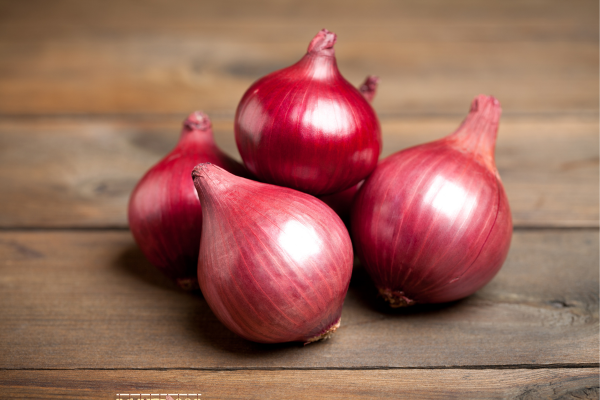The Amazing Health Benefits of Red Onions – By Harold Gunatillake

Onions, scientifically known as Allium cepa, are bulb-shaped vegetables that grow in the ground. They are closely related to other root vegetables in the Allium family, including shallots, leeks, scallions, and garlic. In many cultures, including Sri Lanka, onions are a staple in traditional cuisines, adding depth and flavour to dishes like rice and curry. This article emphasises the benefits of eating onions that many may not know.
In all their forms, onions are delicious, a canvas for culinary creativity, and a powerhouse of health. Whether cooked, raw, or pickled, they are a staple worldwide. Their ability to transform the flavour of a curry or elevate the freshness of a salad makes them a must-have in any kitchen. Beyond their culinary versatility, onions are a rich source of vitamins, minerals, and fibre, offering several health benefits.
Source : facebook
The roots of the word onion are found in imperial Latin, which used the phrase unio to describe a single-formed pearl and, by whimsical extension, a single-bulbed onion. Therefore, the term’s ultimate root is the word unus (“one”), which also lies behind English words like union, unity, and unique.
The main nutritional properties of a medium-sized (100-gram) raw onion include:
- Calcium — 23 milligrams
- Calories — 40
- Carbohydrates — 9.3 grams
- Fiber — 1.7 grams
- Magnesium — 10 milligrams
- Potassium — 146 milligrams
- Protein — 1.1 grams
- Sugar — 4.2 grams
- Vitamin C — 7.4 milligrams
- Water — 89%
While enjoying your rice and curry, consider the health benefits of cooked or raw onions. With their low-calorie content, onions are a good source of minerals and vitamins. They also contain high amounts of antioxidants and sulfur compounds, which provide other health benefits. This low-calorie content can reassure you that you’re making a healthy diet.
Onions are a treasure trove of sulfur-containing compounds shown to significantly reduce the risk of cancer. In onions, this abundance of cancer-fighting compounds, such as quercetin and sulfur, is a powerful boost to your health. It instils a sense of empowerment, knowing you’re making a proactive choice for your well-being. By incorporating onions into your diet, you are arming yourself with natural cancer-fighting properties.
It was found that chemicals from onions killed the colon and breast, including stomach, prostate, lung, and ovarian cancers, by stimulating the pathways that lead to cell death (apoptosis). Apoptosis, a natural process that occurs throughout the lives of almost all animals and plants, is a reassuring sign of the health benefits of onions. This natural process, triggered by the The roots of the word onion are found in
imperial Latin, which used the phrase unio to describe a single-formed pearl and, by whimsical extension, a single-bulbed onion. Therefore, the term’s ultimate root is the word unus (“one”), which also lies behind English words like union, unity, and unique. compounds in onions, can give you confidence in the power of your food choices for your health.
It boosts the immune system.
Incorporating plenty of onions into your diet is a sensible and empowering choice if you want to boost your immune system. Onions are rich in antioxidants and sulfur compounds, which can help strengthen your body’s natural defences, giving you a sense of control over your health. Onions are high in vitamin C, which may help regulate your immune health, collagen production, and iron absorption. It’s also a powerful antioxidant that could help protect your cells from unstable, damaging molecules called free radicals. Onions are rich in B vitamins, including folate and vitamin B6.
Bone health. The antioxidants in onions can improve bone density, decrease bone loss, and help prevent bone—related problems— particularly osteoporosis.
Heart health: Quercetin, a flavonoid, lowers cholesterol and blood pressure, reducing the risk of nonfatal heart attacks and strokes. Onions are rich in chemicals that can help protect your heart, lower your risk of some cancers, and make it easier for your body to produce insulin. They are also one of the most incredible vegetable sources of quercetin, a plant compound with many health benefits.
Digestive health. Onions contain prebiotics, a type of fibre that promotes the growth of healthy bacteria in your stomach. This bacteria creates short-chain fatty acids, strengthening your gut health, reducing inflammation, and promoting digestive health.
Is it reasonable to eat onions every day?
While onions offer many health benefits, consuming excess can lead to gastrointestinal distress, such as irritable bowel syndrome and acid reflux. Although onions are safe to consume, they rarely harm your health if you have any underlying health conditions or consume them in excess.
“Are raw onions safe to eat?”
Both raw and cooked onions have health benefits, though these can vary. Raw onions retain their full complement of vitamins and antioxidants, making them a slightly healthier option if you want to maximise your nutrient intake.
Eating raw onions can provide numerous health benefits but also potential downsides. One common issue is that raw onions may cause or exacerbate stomach pain and irritation, known as heartburn, a symptom of acid reflux.
“Is onion good for hair?”
When added to the hair and scalp, onion juice can provide extra sulfur to support strong and thick hair, thus preventing hair loss and promoting growth. The sulfur from onions may also help stimulate collagen production. Collagen, in turn, helps the production of healthy skin cells and hair growth.
Can we apply onion juice to the face?
“You can apply onion juice to your face every day as a juice. The acids in onion juice make it an ideal remedy to remove dark spots and scars from your face. Another major benefit of onion juice for the skin is increased cell turnover, which results in brighter skin.”
“What are the disadvantages of putting onion on your face?”
Skin Irritation: Onions can be irritating to the skin, especially for those with sensitive skin. This can lead to redness, burning, or an allergic reaction.
Is onion good during periods?
The study found that using onion juice can effectively improve menstrual pain and may be recommended as a treatment. In addition to hypomenorrhea, other menstrual disorders also showed positive effects from consuming onions.
Blood sugar regulation. Eating raw onions can help reduce blood sugar levels, which is critical for controlling type 1 and 2 diabetes.
Eating onions may help regulate blood sugar levels, which is significant for people with diabetes or prediabetes. A small 2010 study of 84 people with type 1 or type 2 diabetes found that eating 100 g of raw red onion significantly reduced fasting blood sugar levels after 4 hours.
How do you use onions to lower blood sugar?
Preliminary trials have found that eating onions in 60 and 100 grams (about 2 and 3.5 ounces) daily lowered fasting blood glucose levels and the fasting response to glucose ingestion (glucose tolerance) in subjects with type 2 diabetes. Onions may also act as an anti-inflammatory in people with asthma.
Does cooking onions increase sugar?
“Onions generally have a low to medium GI score, which means they have a relatively low impact on blood sugar levels. The GI score of raw onions ranges from 10 to 15, which is considered low. Cooked onions, on the other hand, have a slightly higher GI score ranging from 35 to 45, which is still considered low to medium.”
Image Source : freepik
Which onion is best for diabetes?
Red onions, in particular, contain anthocyanins, plant pigments in the flavonoid family that give red onions their deep colour. These may protect against diabetes and certain types of cancer.
What are the benefits of drinking boiled onion water?
Drinking onion water can help with digestion. Onions are rich in fibre, which aids in regulating healthy bowel movements. They are also low in calories and can boost the body’s metabolic rate, helping to manage symptoms of diabetes. When consumed in moderation, onions can also help regulate blood sugar levels.
Prevents blood clots: raw onions have a high concentration of pyruvate, a type of acid that promotes anti-platelet activity, which helps prevent blood clots. As you heat onions, the pyruvate concentration is lowered, decreasing the strength of the onion’s anti-platelet agents. Steaming. Steaming onions can have some of the most dramatic effects on anti-platelet activity. Just 3 to 6 minutes of steady steaming can destroy pyruvate concentrations entirely. Anything more than 10 minutes might negatively affect the onion’s nutritional value.
Those on anti-platelet agents like clopidogrel must be aware of this situation.
So, readers, I hope this article covers everything you need to know about red onions. Be cautious, as raw onions can cause bad breath – avoid them before a date.
Storing onions
Onions prefer a cool, dark, and dry environment, as added moisture (which may accumulate in your fridge’s veggie drawer) can lead to moulding, and sunlight can lead to sprouting. Onions should also be stored alone, away from other fruits and vegetables, especially apples and potatoes, which emit high amounts of ethylene gasses, causing nearby onions to degrade faster. And the container matters, too — unpeeled onions need space for airflow, whereas cut onions won’t last long outside of an airtight environment.


























